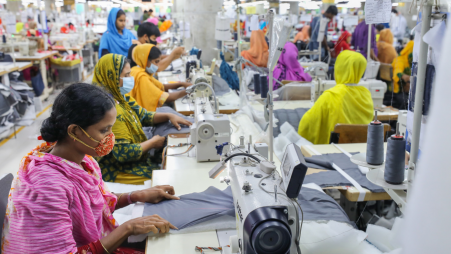Apparel industry upbeat with positive gesture from global buyers
- Update Time : Sunday, August 18, 2024

TDS Desk:
Some global fashion brands have increased their sourcing from Bangladesh despite the recent political turmoil in the country centring on the quota reform movement that eventually ousted the Sheikh Hasina-led government.
Industry insiders say brands from Europe, America and East Asian countries increased their orders thanks to exporters having maintained their communications with brands and gone into overdrive during political turmoil since mid-July to meet export deadlines.
Taking over as the head of the interim government by Nobel laureate Professor Muhammad Yunus elevated the brand image of Bangladesh, they feel.
While US brands US Polo, Gap and Express are among the big names that are increasing their sourcing from Bangladesh, Korean Brand BYC is a new entrant.
Giant Group Managing Director Faruque Hassan said US Polo is the largest buyer of his company and has already increased orders beyond their expectation. The total orders from US Polo occupied about 40% of their capacity, he said.
The leading apparel exporter said during internet blackout imposed by the ousted regime in July, he sent top officials of his company to the US Polo office to explain the situation prevailing in Bangladesh at that time. The visit helped retain the buyer’s confidence and win more orders, he explained.
Another leading exporter Shovon Islam, managing director of Sparrow Group, said three US buyers have already increased their orders.
US Polo and Gap are regular buyers and another US buyer Express has also increased its sourcing after the brand comes from bankruptcy, he said.
Md Sharafat Hussain Sohail, senior manager (merchandising) at Masco Group, got an inquiry from a top Korean brand willing to source from Bangladesh for the first time.
“A team on behalf of that buyer has booked a schedule to visit our office this week,” he added.
He said Masco Group makes about 10 lakh to 15 lakh pieces of garments every month for H&M. They have not faced any challenge so far, he said, adding that his firm is working to supply for next summer in the EU market.
Sohail said, “Two of our European buyers have already expressed trust in the leadership of Prof Yunus. They are very hopeful of a better future for the country.”
Good gestures from buyers
Most of the other reputed brands and buyers like G-Star Raw, M&S, H&M and inditex are not imposing any penalty for delayed shipments due to disruptions caused by the recent unrest.
Swedish retailer H&M AB told its suppliers in Bangladesh that it will not seek discounts due to delays that might occur after factories were shut down by deadly protests, according to Bloomberg.
Talking with a top official of the retailer’s Bangladesh office, seeking anonymity, said, “Our sourcing strategy hasn’t changed and we are not moving away anything (orders).”
Echoing with H&M, Inditex Dhaka office top official said their business is going normal and there is no shift in orders or pressure for discount yet.
Some exporters, however, are a bit worried about the ongoing situation as protests are still going on. Pacific Jeans Group Managing Director Syed Mohammad Tanvir said representatives of global brands and buyers are somewhat concerned as the political situation is not completely normal yet.
“In this situation, some future orders may move elsewhere,” he said, sharing his concern and hoping that the interim government would send a message reassuring the buyers.
Some exporters may lose orders
The industry insiders mentioned that some companies like Beximco and NASA may lose orders because of the recent revelation of financial sector irregularities linked to the ousted regime.
In a recent discussion, Hameem Group Managing Director AK Azad told that about 20% of their orders already moved to other competitive countries due to the current law and order situation.
Industry leaders cited electricity and gas shortages, and container congestion at ports and airports as major challenges that are haunting them.
If the interim government addresses the problems, the apparel industry will be able to increase its global market share, they hoped.















